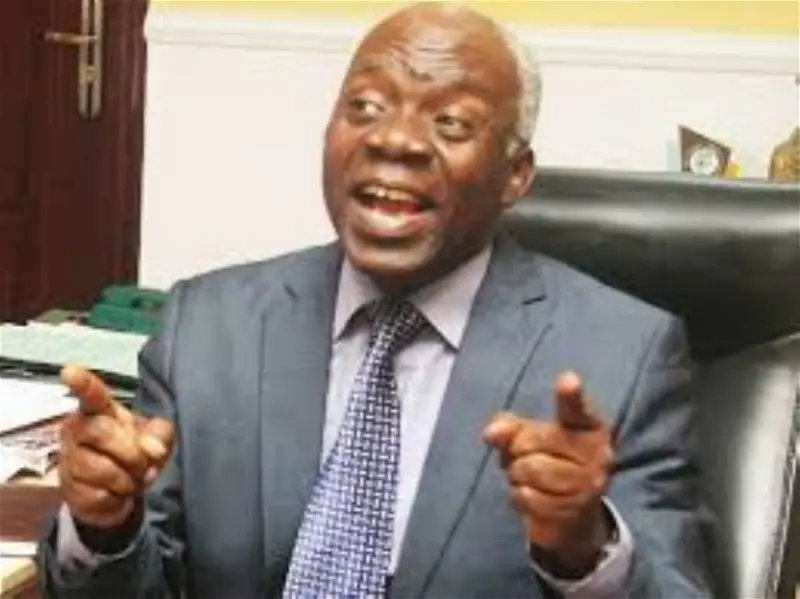Human Rights Lawyer, Femi Falana, SAN, has responded to Attorney General of the Federation and Minister of Justice, Prince Lateef Fagbemi, SAN, who described the ongoing industrial action by organized labour as “premature, ineffectual, and illegal.”
Fagbemi, in his statement on Sunday, emphasized that the demands for an increased minimum wage are being addressed and that the labour unions did not meet the necessary conditions to initiate a strike. He noted that the tripartite committee on the new national minimum wage, which includes the Federal Government (FG), state governments, and private sector representatives, has not concluded its negotiations.
The AGF argued that the interests and capacities of all employers in the country must be balanced to determine an appropriate minimum wage. He also pointed out that a National Industrial Court (NIC) order prohibiting any strike action by the unions is still in effect.
Fagbemi urged the unions to reconsider their strike and return to negotiations. However, Falana countered that his client, the Organized Labour, has not violated any laws and advised that the Tripartite Committee expedite the negotiation process to allow for a resolution and the subsequent calling off of the strike.
His words: “We remain Solicitors to the President of the Nigeria Labour Congress, Comrade Joe Ajaero and the President of the Trade Union Congress, Comrade Festus Osifo. We have the instructions of both labour leaders to write this letter.”
“In your letter dated 1st June, 2024, you claimed that the ongoing industrial action by our clients for a new national minimum wage constitutes a dissobedience of the orders of the National Industrial Court and the Court of Appeal. You equally accused our clients of breaching sections 41 and 42 of the Trade Disputes Act by not giving a 15-day notice before the commencement of the strike.”
“In reacting to your allegations seriatim, we wish to state that our clients have neither disobeyed court orders nor breached the provisions of the Trade Disputes Act in any manner whatsoever and howsoever.”
ON EFFECT OF FAILURE TO GIVE NOTICE OF A STRIKE BY WORKERS
“Our clients had always given more than a 15-day notice of an industrial action or strike in line with the provisions of section 41 of the Trade Disputes Act. But upon the receipt of the notice of the strike the Federal Government had always rushed to the National Industrial Court to procure an ex parte order to restrain workers from embarking on any form of strike or protest whatsoever.
“Even though the offices of the Nigeria Labour Congress and Trade Union Congress and their counsel are a stone’s throw from the Federal Ministry of Justice the Federal Government has consistently procured ex parte orders to stop strikes on the basis of self induced urgency. Thus, the National Industrial Court has through the issuance of ex parte orders obliterated the right of Nigerian workers to participate in any strike contrary to the clear provisions of the Trade Union Act and Trade Disputes Act.
“Our clients have not committed any offence by participating in the ongoing strike. In Suit No. NICN/ABJ/ 270/2022 between Federal Government & Anor vs. Academic Staff Union of Universities (ASUU) the National Industrial Court held that the penalty for embarking on an industrial action in Nigeria is the forfeiture of salaries or wages during the duration of the strike. According to the presiding Judge, BB. Kanyip PNIC, all the provisions of the Trade Disputes Act “permit the ‘no work, no pay’ rule; such that an employer is legally permitted not to pay strikers salaries or wages for the period of the strike they undertook.”
ALLEGED DISOBEDIENCE OF COURT ORDERS
“You recalled the pendency of the interim injunctive order granted on 5th June 2023 in SUIT NO: NICN/ABJ/158/2023 – FEDERAL GOVERNMENT OF NIGERIA & ANOR V. NIGERIAN LABOUR CONGRESS & ANOR, which order restrained both Nigeria Labour Congress and Trade Union Congress from embarking on any industrial action/or strike of any nature. With respect, the order does not refer to the ongoing strike emanating from the trade dispute over the new minimum wage. In any case, the case has been amicably resolved as parties and their counsel have signed the terms of settlement drawn up by your good self.
“As you are no doubt aware, the case of Federal Government v Nigeria Labour Congress has been resolved as the parties and their counsel have signed the terms of settlement drawn up by your good self. So our clients cannot be accused of contravening the terms of the interim order of the National Industrial Court. Hence, the Federal Government has not filed any contempt proceedings against our clients in the National Industrial Court.
“You also referred to the case of Oshiomole & Anor. v FGN (2004) LEPLR-5188(CA) and proceeded to give the impression that the Court of Appeal had prohibited workers from embarking on strike. With respect, that interpretation does not represent the decision of the Court of Appeal. Indeed, their Lordships unanimously upheld the right of workers to strike on matters arising from trade disputes. To that extent, our clients are on terra firma in leading the current industrial action over the new minimum wage.
CONCLUSION
“Finally, you did assure the nation’s trade unions that the Government would “continue to adopt a conciliatory approach to resolving matters pertaining to workers and citizens welfare in the spirit of collective bargaining.” On our part, we have advised our clients to cooperate with the members of the Tripartite Committee on National Minimum Wage in the ongoing negotiation meetings in the interest of industrial harmony in the country.
“While appreciating your intervention in the industrial action, we are compelled to advise the members of the Tripartite Committee to speed up the negotiations to enable our clients to call off the strike”.

